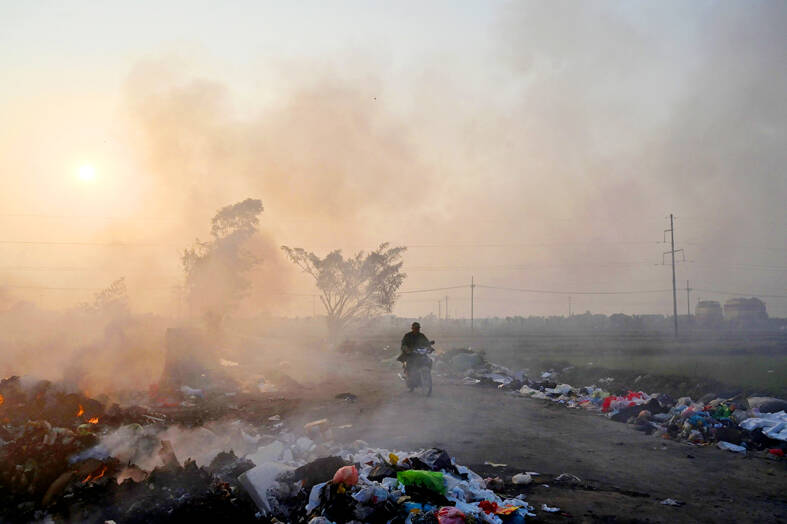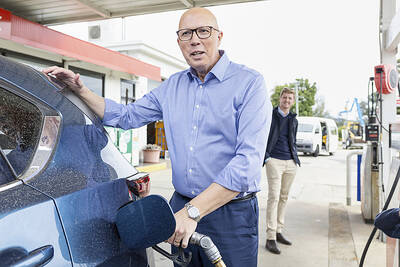Toxic smoke billows from a burning mound of plastic bags and leaves on Le Thi Huyen’s farm in Hanoi, a city battling an alarming air pollution surge that the communist government appears in no hurry to fix.
In the last three months the Vietnamese capital has regularly topped a list of the world’s most polluted major cities, leaving its 9 million residents struggling to breathe and even to see through a thick blanket of smog.
Despite a string of ambitious plans to address the crisis, few measures have been enforced, and there is little monitoring of whether targets are actually achieved, analysts say.

Photo: AFP
Officially, the burning of rice straw and waste was banned in 2022 across the country — but that is news to Huyen.
“I’ve never heard of the ban,” Huyen said.
“If we don’t burn, what should we do with it?” she asked, glancing at her smoldering heap of waste.
The stench of smoke and burning plastic is a constant feature of life in many Hanoi districts.
The country’s poor air quality — which kills at least 70,000 people a year, according to the WHO — is also linked to its coal power plants, the rising number of factories, high usage of petrol motorbikes and constant construction.
Vietnam is a manufacturing powerhouse with a soaring economy, and energy needs to match, but its growth has come at a cost, particularly in its buzzing capital whose geography compounds its air quality woes.
However, unlike in other prominent Asian cities battling pollution, such as New Delhi or Bangkok, life in Hanoi goes on as normal no matter how bad the air. Authorities do not close schools. There is no work-from-home scheme.
The Vietnamese government — which has close links to powerful economic interests, analysts say — has also imprisoned independent journalists and environmentalists who have pushed for faster solutions.
Hanoi has frequently sat at the top of IQAir’s ranking of the world’s most polluted major cities and was rated among the top 10 polluted capitals by the Swiss monitoring company in 2023.
Breathing the toxic air has catastrophic health consequences, with the WHO warning strokes, heart disease, lung cancer and respiratory diseases can be triggered by prolonged exposure.
The World Bank estimates that air pollution — which returned to pre-COVID-19 pandemic levels in 2023 — costs Vietnam more than US$13 billion every year, equivalent to almost three percent of the country’s GDP last year.
“The situation is urgent,” World Bank lead environmental economist Muthukumara Mani, who is based in Hanoi, said.
Even state media, after years of near silence on air quality, has become noticeably vocal in Vietnam, a one-party state.
VietnamNet, the official news site of the Vietnamese Ministry of Information and Communications, published a rare call for action in January, warning air pollution was “a crisis demanding immediate attention.”
Mani said there was recognition of the problem “at the highest level in the country,” citing a trip to China made by senior Hanoi officials to learn how Beijing fixed its once-awful air.
While Hanoi has floated the idea of low-emission zones and devised an action plan that aims for “moderate” or better air quality on 75 percent of days annually, it is not clear whether either would be enforced.
“The issue sometimes with Vietnam is that people pay much more attention to targets than what’s actually being delivered,” said Bob Baulch, professor of economics at RMIT University Vietnam.
Tran Thi Chi had years of breathing difficulties before she made the difficult decision to uproot from the city center house where she lived for more than a decade.
“The air in Hanoi had become so thick that I felt like I didn’t have oxygen to breathe,” said the 54-year-old, one of the first of her friends to buy an air purifier.
However, millions of others have no choice but to live with the noxious air, prompting environmental activists to push for faster change — until authorities launched a crackdown.
Nguy Thi Khanh, founder of GreenID, one of Vietnam’s most prominent environmental organizations, was a rare voice challenging Hanoi’s plans to increase coal power to fuel economic development, before she was jailed in 2022.
Four other environmentalists were also imprisoned in 2022 and 2023.
“This repression has had a chilling effect that has made it virtually impossible for people to advocate for the government to address the problem of air pollution,” said Ben Swanton of The 88 Project, which advocates for freedom of expression in Vietnam.
Chi is fearful for the city she has always loved.
“We need urgent, realistic measures from authorities,” she said. “We have no time to wait around.”

‘EYE FOR AN EYE’: Two of the men were shot by a male relative of the victims, whose families turned down the opportunity to offer them amnesty, the Supreme Court said Four men were yesterday publicly executed in Afghanistan, the Supreme Court said, the highest number of executions to be carried out in one day since the Taliban’s return to power. The executions in three separate provinces brought to 10 the number of men publicly put to death since 2021, according to an Agence France-Presse tally. Public executions were common during the Taliban’s first rule from 1996 to 2001, with most of them carried out publicly in sports stadiums. Two men were shot around six or seven times by a male relative of the victims in front of spectators in Qala-i-Naw, the center

Australia’s opposition party yesterday withdrew election promises to prevent public servants from working from home and to slash more than one in five federal public-sector jobs. Opposition leader Peter Dutton announced his conservative Liberal Party had dropped its pledge that public servants would be required to work in their offices five days a week except in exceptional circumstances. “I think we made a mistake in relation to this policy,” Dutton told Nine Network television. “I think it’s important that we say that and recognize it, and our intention was to make sure that where taxpayers are working hard and their money is

Canadian Prime Minister Mark Carney is leaning into his banking background as his country fights a trade war with the US, but his financial ties have also made him a target for conspiracy theories. Incorporating tropes familiar to followers of the far-right QAnon movement, conspiratorial social media posts about the Liberal leader have surged ahead of the country’s April 28 election. Posts range from false claims he recited a “satanic chant” at a campaign event to artificial intelligence (AI)-generated images of him in a pool with convicted sex offender Jeffrey Epstein. “He’s the ideal person to be targeted here, for sure, due to

DISPUTE: Beijing seeks global support against Trump’s tariffs, but many governments remain hesitant to align, including India, ASEAN countries and Australia China is reaching out to other nations as the US layers on more tariffs, in what appears to be an attempt by Beijing to form a united front to compel Washington to retreat. Days into the effort, it is meeting only partial success from countries unwilling to ally with the main target of US President Donald Trump’s trade war. Facing the cratering of global markets, Trump on Wednesday backed off his tariffs on most nations for 90 days, saying countries were lining up to negotiate more favorable conditions. China has refused to seek talks, saying the US was insincere and that it